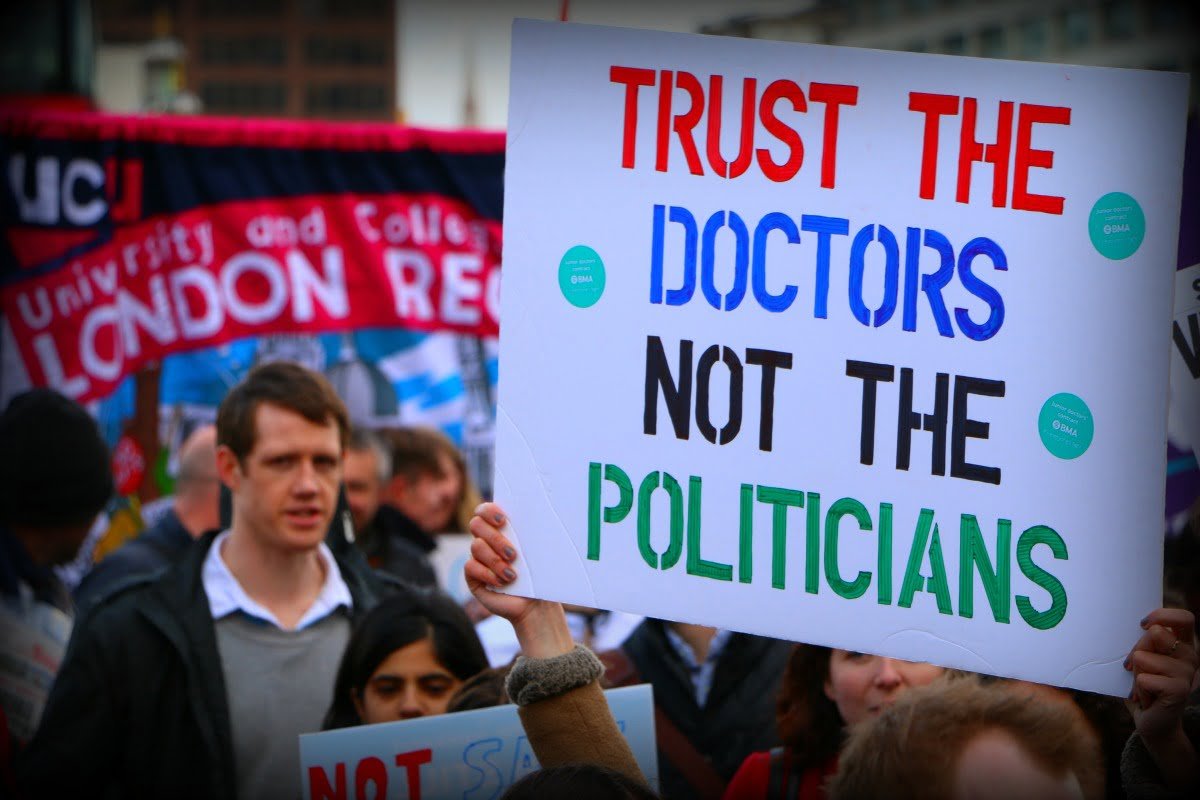After months of negotiation interspersed with strike action, junior doctors have now voted to reject the new contract that has been offered by the Tories. The government has gone ahead and said they will impose the contract. Junior doctors have stated that they will continue to fight.
Last month, the BMA’s 45,000 junior doctors voted on whether to accept the terms of a new contract unveiled in May, following talks between the union and government representatives. The BMA’s Junior Doctors Committee (JDC) decided not to take a formal position on whether to advise its members to accept or reject the deal.
In the past several weeks, junior doctors have passionately debated the new contract’s merits amongst themselves. Whilst some asserted that the new deal was the best offer available, others expressed concern that the deal still fell short of the status quo. The “best you can get” deal is not necessarily the same as a good one.
Among the concerns raised were on the issues of weekend pay, basic pay rates, and working hours. In all these areas, there was a large mood of opposition towards the new negotiated contract, with many medics feeling that it would leave them and their colleagues worse off than before. (See footnote for further details contained in the new contract.)
Vote to reject
On the 5th July, it was announced that 58% of junior doctors who voted rejected the new contract, whilst 42% voted in favour. Voter turnout was 68%. After the referendum results were declared, Johann Malawana, chair of the BMA’s Junior Doctors Committee, who had pushed for junior doctors to accept the deal, announced his resignation.
In a letter to members, he stated: “I was hopeful that the resulting contract would be acceptable to our amazing membership. However, I believe the fundamental breakdown in trust caused by the government’s actions over the last five years has resulted in a situation where no solution is possible, particularly when a government is so keen to declare victory over frontline staff”. He encapsulated the views of many doctors and NHS staff in his comment: “As we lurch headlong into a wider crisis of this government’s making. I worry that a government that frankly could never be trusted with the NHS, now has every excuse to dismantle it, underfund it and undermine it.”
A day after Dr Malawana gave notice, fellow JDC member Ellen McCourt was appointed as interim BMA junior doctors committee chair until fresh elections are held in September. Dr McCourt asserted that the, “JDC has agreed to continue to fight the imposition. In order to best achieve this we will be consulting you both on the contract and on ongoing action.”
The Tories, meanwhile, have thrown down the gauntlet and made it clear that they will not negotiate any further with the BMA. Jeremy Hunt, the health secretary, stated in parliament yesterday that the new contract would be imposed, in a phased manner, on various subgroups of junior doctors between October 2016 and October 2017. This amounts to an open declaration of war by the Tories against NHS workers.
Uncharted waters
Prior to this latest development, the BMA was already sailing in uncharted waters. Now we have gone a step beyond. No one can say for certain how events will unfold in the coming weeks. With the whole of British politics in turmoil following the Brexit vote, much will depend on the outcome of the crises, splits, and civil wars taking place inside both the Tories and Labour.
In recent days, three key political players – Cameron, Johnson, and Farage – whose positions only recently seemed strong, signalled that they are on their way out. Yet despite the best effort of right-wing Labour MPs and their media allies, Corbyn remains in place.
If the Corbyn movement defeats the Blairite coup whilst the Conservative Party continues to feud, this would give an enormous boost to those fighting against the Tories and their attacks on public services. In this scenario, the question of joint industrial action across the whole public sector should be raised, with the call made for a 24-hour general strike to topple the Tory government.
Over the past several months, the BMA has received huge support from the public and across the trade union movement. This solidarity has, in turn, been reciprocated: a few days ago, for example, Dr Malawana sent an official letter to the General Secretary of the National Union of Teachers expressing solidarity with the NUT’s recent strike action. Individuals and groups of doctors, meanwhile, have – outside of the official capacity of the BMA – forged strong links with other healthcare workers, unions, and the wider labour movement.
As Marx explained, in certain periods in history the equivalent of years worth of events can be crammed into only a few weeks. In the preceding years, a gradual amassing of discontent gathers below a seemingly stable surface, unseen or disregarded by politicians and analysis. When a critical point is reached, this accumulation of dissent bursts out into the open.
We are now seeing such a process taking place – not only amongst healthcare workers, who have said “enough is enough” when it comes to attacks on the NHS, but across the whole trade union movement, with workers in universities and schools also coming out on strike recently against Tory cuts.
The task now is to unite all these struggles in order to kick out all the Tories, and to fight for a Corbyn-led Labour government on a bold socialist programme.
Footnote:
According to the new contract, weekend working hours would be paid at the rate rate as weekdays, though doctors would receive a pay supplement for working weekends, ranging from 0 per cent for working less than one-eighth of weekends through to 10 per cent for working up to half of all weekends. Pay for working nights shifts would be reduced.
The method of determining a junior doctor’s basic pay will also change from being based upon length of service to grade attained. Despite a basic pay rise of around 10 per cent, doctors will earn less for weekends and nights, which may result in some getting less than they currently earn.
Likewise, under the new contract, there will be no increase in pay for the most senior junior doctors working between the grades ST3 and ST8, which can take up to five years, despite an increase in responsibility and medical defence fees during that time. However, a few specialities, such as A&E and psychiatry, within which a recruitment and retention crisis exists, will receive a few thousand pounds more a year.
Each NHS trust shall also be allocated a guardian to ensure working hours are monitored and trusts fined if these are breached. However, it appears that a single guardian may be responsible for monitoring the rotas and working hours of a few hundred doctors at a time and how effective they will be in practice remains to be seen. Junior doctors have also raised concerns that less-than-full-time (LTFT) doctors may lose out financially under the new contract as well as inadequate protection for whistle blowing.






